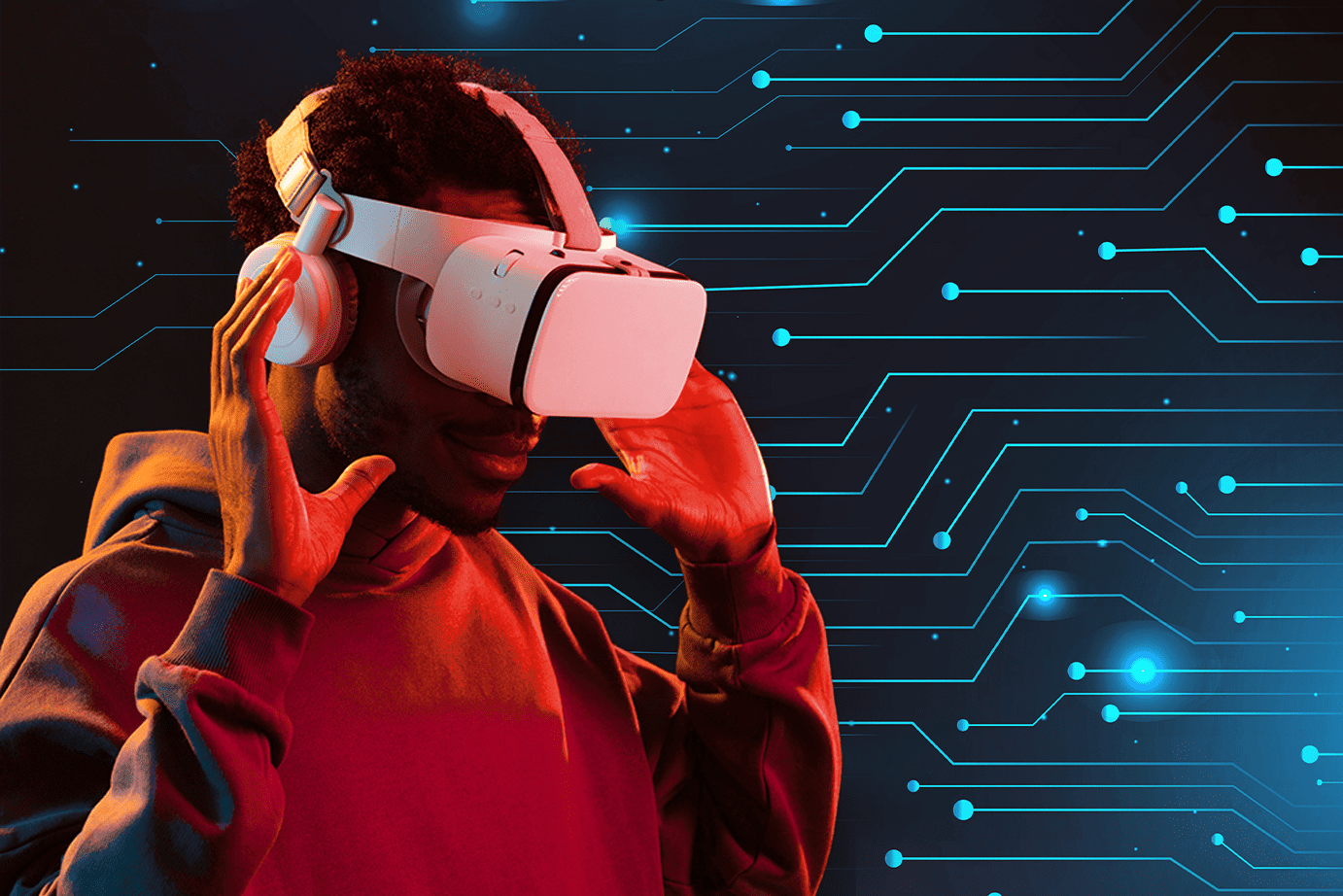The world is constantly changing at a high speed, and this is even more true in the field of IT! Therefore, it’s crucial for organizations to be prepared to adapt to this VUCA (Volatility, Uncertainty, Complexity, and Ambiguity) environment, which always brings new challenges. In this context, technological innovations are gaining a significant role in the business scenario, establishing themselves as essential strategies for the progress of organizations. Thinking strategically about 2024 is, therefore, essential for every company that not only wants to remain but also to grow in an ever-changing business environment. Therefore, learn in this blog about some of the main trends for the IT area. The new year has already begun, check it out!
A World Expanding with Emerging Technologies
Initially, let’s talk about the emerging technologies that are already more present in the daily life of organizations.
These technological innovations that are emerging and gaining prominence, often transforming the way we live, work, and interact, have the potential to significantly impact various sectors of society and the economy. The term “emerging” indicates that these technologies are on the rise and have not yet reached full maturity but are rapidly gaining relevance.
Some of the emerging technologies that have been widely discussed include:
- Artificial Intelligence (AI) and Machine Learning: Systems that can learn and make decisions based on data, without direct human intervention.
- Internet of Things (IoT): The interconnection of physical devices through the internet, enabling data exchange and process automation.
- Blockchain: A distributed ledger technology that offers transparency, security, and reliability in digital transactions.
- Augmented Reality (AR) and Virtual Reality (VR): Technologies that combine the digital world with the real world (AR) or create entirely virtual environments (VR) to offer immersive experiences.
- Synthetic Biology: Manipulation and creation of biological organisms to develop new applications, such as biofuels, medicines, and materials.
- Quantum Computing: Using principles of quantum mechanics to perform complex calculations much faster than traditional computers.
- Advanced Robotics: Development of robots and autonomous systems capable of performing complex tasks in various environments.
- Autonomous Vehicles: Cars, drones, and other vehicles capable of moving without human intervention, using advanced sensors and algorithms.
These technologies have the potential to positively impact various sectors, such as healthcare, transportation, energy, education, and many others. However, they also present challenges, especially for IT departments in companies.
Main Challenges for IT Departments
Here are some of the main organizational challenges that companies may face when integrating these innovations into their businesses:
Organizational Culture: The introduction of new technologies often requires a change in organizational culture. Resistance to change by employees can be a significant challenge. It’s necessary to promote an innovation mindset and ensure that employees are willing to learn and adopt new tools and processes.
Skills and Training: Emerging technologies often require specialized skills that may not be present in the existing team. Training or hiring professionals with the right skills is crucial. This can include knowledge in artificial intelligence, machine learning, blockchain development, among others.
Integration with Existing Systems: Integrating new technologies with existing systems can be complex. Many companies have legacy infrastructures, and compatibility and interoperability between old and new systems can be challenges to overcome.
Information Security: Emerging technologies often introduce new security risks. Increasing information security to protect sensitive data and systems against cyber threats is essential. This includes specific considerations, such as protection against AI attacks, blockchain security, and data protection in IoT devices.
Regulation and Compliance: Many emerging technologies still lack clear regulations. Companies need to deal with legal and regulatory issues related to the use of these technologies, especially in highly regulated sectors, such as healthcare and finance.
Financial Investment: Implementing emerging technologies may require significant investments in hardware, software, training, and research. Companies need to be prepared to allocate substantial financial resources to ensure successful implementation.
Ethics and Responsibility: Some technologies, like artificial intelligence, raise ethical questions about privacy, algorithmic bias, and autonomous decision-making. Companies need to develop ethical policies and governance practices to address these concerns.
Change Management: The introduction of emerging technologies often implies significant changes in business processes. An effective change management plan is necessary to minimize resistance and ensure a smooth transition.
By addressing these challenges, companies can maximize the benefits of emerging technologies and position themselves more competitively in their respective markets.
Main Technological Trends for 2024
So, let’s go to the main trends for the next year:
Increased Protection in the Digital System
The trend to increasingly improve the digital immune system stands out as highly promising for 2024. This feature functions like the human immune system model, i.e., protecting organizations and systems against external threats, in this case, cyber threats.
This protection considers sophisticated data analysis techniques, Artificial Intelligence, and machine learning, all working together to identify and combat attacks in real-time. Thus, the system detects and neutralizes invaders, minimizes damages, and preserves the integrity of data and systems.
AIOps
AIOps, short for Artificial Intelligence for IT Operations, is an emerging technology that integrates advanced artificial intelligence and machine learning techniques to enhance the efficiency and automation of Information Technology operations.
By using sophisticated algorithms, this tool analyzes large data sets, identifying patterns, anticipating potential problems, and making autonomous and accurate decisions. In other words, it is through these data that companies obtain benefits.
The implementation of AIOps enables organizations to optimize the performance of their systems, improve the availability of services, and reduce the time required to resolve operational issues. Thus, it offers a more reliable experience for users.
Increase in AI Development
The expansion of development through Artificial Intelligence is the use of AI and machine learning technologies to assist software engineers in the process of creating, coding, and testing applications.
AI-enhanced software engineering increases developers’ productivity and empowers teams to meet the growing demand in business management.
These AI-based development tools enable software engineers to spend less time coding, allowing them to focus more efforts on strategic activities.
IT Outsourcing
IT Outsourcing involves the mobilization of various human and technological resources. It is undoubtedly a growing practice of outsourcing services to manage infrastructure and conduct activities related to information technology.
Given the increasing complexity of demands in the IT area, many companies opt to outsource specific activities or even the entire team with their specific skills. This allows them to focus on their core operations while reducing costs and gaining access to advanced and up-to-date resources.
Making this a responsibility for specialists is a strategy to ensure that the company fully utilizes the potential of emerging technologies.
Extended Reality
Extended or augmented reality emerged as a major technological transformation, bringing a new perspective on our perception and interaction with the environment around us. For the year 2024, we will observe even more novelties in this area in our daily lives such as in app development, in games and entertainment, in the shopping experience, in health and wellness, in industry and retail, in education and in training models, and much more.
Background: How to Think About the World of IT in 2024
Thinking about IT always requires being up-to-date with new technologies and trends, and it would be no different in 2024. Being agile in adapting to changes and focusing on aligning new tools with the strategic objectives of the organization is a golden rule. The outlook for the near future should consider the following points:
- Anticipation of Technological Advances: always stay informed about emerging technologies, such as artificial intelligence, machine learning, quantum computing, blockchain, and Internet of Things (IoT) and anticipate how these technologies may evolve and impact IT operations.
- Focus on Cybersecurity: consider new approaches and technologies to strengthen cybersecurity and protect data against increasingly sophisticated threats.
- Adoption of Cloud Models: evaluate how organizations are migrating to hybrid cloud, multicloud models, and how this affects IT infrastructure and operations.
- Focus on Sustainability: IT companies increasingly need to adopt sustainable practices. Contribute to sustainability, from energy efficiency to responsible management of electronic waste.
- Improvement in User Experience: think about how IT solutions can be designed to better meet the needs and expectations of users.
- Growing Integration of Artificial Intelligence: think about how intelligent systems can optimize processes, improve data analysis, and enhance the user experience.
- Training Teams for Change: invest in training and development so that teams are up-to-date with the latest technologies and practices.
- Remote Work: think about how IT infrastructures can be improved to accommodate this long-term trend.
Count on ETHO IT SOLUTIONS
ETHO IT Solutions was created with the purpose of facilitating the connection between the most qualified professionals in emerging technologies, and companies facing increasing complexity in corporate IT and Digital Transformation projects.
We are a company specialized in allocating resources to boost your organization’s IT projects. With agility, transparency, and commitment, we assist our clients in forming the ideal team, complementing the necessary competencies for innovation projects, digital transformation, implementation, and support of emerging technologies in your company.
We have a team of experts with advanced skills in emerging technologies, including SAP, SalesForce, FullStack, and Google Cloud.
By choosing ETHO, you have the support of a team of managers with a successful track record in the best consulting firms in the market. Our partners and technicians are experienced professionals, with extensive knowledge of technological challenges and the implementation of corporate projects.
Talk to one of our consultants today





Comments are closed